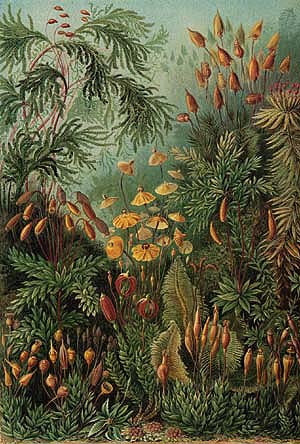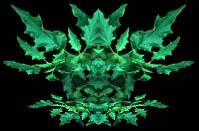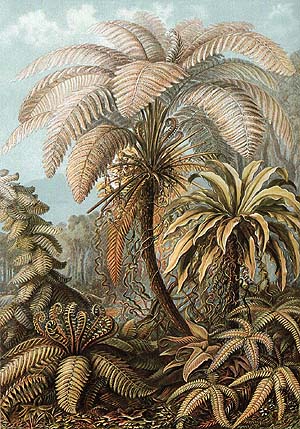From Anarchy and Ecstasy, Visions of Halcyon Days
|
In an important article, Jay Vest convincingly demonstrates that the words "will" and "wild" derive from a common etymological root. For primal Europeans, nature was pervaded by a will force that remained beyond their power to influence. What nature autonomously willed became identified as wild.
Wilderness then means "self-willed-land" or "self-willed-place" with an emphasis upon its own intrinsic volition... This "willed" conception is itself in opposition to the controlled and ordered environment, which is characteristic of the notion of civilization. While control, order, domination and management are true of civilization and domestication, they are not essentials of primal culture... Nature worship among primal Indo-Europeans evidences a traditional theme of sacred natural places, free from desecration by humans and their technology. Such sacred places were wilderness in the deepest sense; they were imbued with will- force,—willed, willful, uncontrollable—and with spirit. Thus, they held about them a sacred mystery—a numinous presence. It is from this tradition that the "will-of the-land"—wilderness—concept emerges.Vest's remarks recover important information, but remain curiously exteriorized. The contours of a spirituality structured around the recognition of a sacred wilderness—the significance of its symbolism and ritual—are skilfully outlined. But the interiority of this experience—what it felt like and what it meant to be immersed in such a wilderness—remains beyond Vest's purview.
1
One reason for this deficiency may be the lack of an appropriate vocabulary. Vest's article establishes that primal notions of wilderness are diametrically opposite to those operative in contemporary mainstream discourse. Archaic humans regarded the wilderness as a site of positive energies, whereas today power complexes demand that it be considered as a place of evil and negativity which deserves domination and exploitation. In Against His-story. Against Leviathan!, Fredy Perlman retraces the process whereby power—through authority structures, imperial and Judaeo-Christian civilizing forces—converts nature into a wasteland, thus forcing the term "wilderness" to acquire pejorative connotations. But the semantic history of a cognate term which denotes the interior experience of sacred wilderness—"bewilder"—has not received similar examination. Necessarily, this semantic reconstruction must be speculative. Contextual factors, however, indicate appropriate orientations for an accurate recovery of the term's original meaning.
|
Individuals undergoing this process were bewildered, in the original, integrated sense of the term. They entered "pathless places" in two senses. First, wilderness areas (i.e., the vast totality of the world) contained no paths or tracks—neither the roads of imperial domination and plunder constructed by the Romans, nor the routes of commerce carved by Islamic merchants. By definition, the wilderness remained free from incursions by technology. And secondly, there were no established journeys to be undertaken, no predetermined paths to traverse. All social codes were annulled: vision, emotion and behaviour were no longer subject to regulation and control. Total transformation was possible. But the directions—for unlimited eversion were no longer, or only minimally, under individual control. The individual will, subsumed within the will-of-the-land, no longer retained the power of volition. Possessed by the wilderness, individuals eagerly became vehicles for its sacred and ecstatic expression.
Evidence to substantiate these contentions regarding the bewilderment process can be derived from a consideration of an associated term, "amazement." The OED variously defines "amaze" as "to put out of one's wits... bewilder, perplex," "to overcome with sudden fear or panic," and "to overwhelm with wonder, to astound or greatly astonish." It also defines "amazedness" as "loss of self-possession through fear." This cluster of ideas clearly parallels the meanings attached to "bewilder." Indeed, they may ultimately derive from a common origin. The OED notes that "amaze and a maze were often identified." And this etymological link provides the crucial connexion. In certain primal traditions, the maze or labyrinth played a homologous role to that of the sacred wilderness area—in fact, the two may have been indistinguishable:
Extremely complex ideas were expressed through the symbol of the labyrinth. First, the initiate had to find the way through the underworld—the womb of the Mother—going through symbolic death to be reborn through her on a larger psychic level. Simultaneously, by dancing the winding and unwinding spiral, the initiate reached back to the still heart of cosmos, and so immortality, in her. The dance would have been combined with sexual rites and the taking of some hallucinogen like the legendary soma. In the resulting illumination soma and self were experienced as one with the cosmic self in orgasmic ego-death. The ecstatic centre of the labyrinth was the no-mind centre of orgasm experienced as death, creative madness, and loss of the conditioned "self.""Bewilderment" and "amazement" once denoted the experienced interiority of radical purification through displacement. Losing one's self in a maze meant precisely that, not merely a sense of disorientation. Bewilderment entailed an encounter with death and transcendence, and so was necessarily characterized by complex interacting responses, including terror, wonder and ecstasy. The wilderness overwhelmed the individual will from three directions. Spiritual techniques for arousing the coiled kundalini energy eroded ego boundaries and merged the individuated self within the cosmic All. Hallucinogens derived from poisonous substances transported the individual to the brink of physical decease. And uncontrollable sexual desires overcame any social inhibitions placed on the search for erotic pleasures. The combination of these three elements took the individual to the edge of dissolution—as a psychological, physical, and social/ethical entity. But only to the edge: vestiges of consciousness remained so that the wilderness could become aware of itself, achieve a knowledge of its own awesome nature. However, the process remained reciprocal: the individual emerged transformed and whole, often bearing shamanic gifts—such as prophetic powers, healing capacities and visions—to enrich the community. Such symbiosis constituted the core of the ancient Mysteries.
3
4
Once "wilderness" acquired pejorative connotations, however, the bewilderment phenomenon underwent a similarly negative redefinition. The originally integrated meanings of the process were separated and demonized, gradually assuming the forms in which they are currently known. On the one hand, bewilderment now signifies the feeling experienced when one is lost, disorientated in an unfamiliar—and hence potentially threatening—context or environment, unable to find an exit. On the other hand, the term denotes a derangement of perceptions, not in a positive sense of possession by the wilderness, but in the negative sense of perplexity and bafflement. To lose one's self now becomes an adversity because the failure of the cognitive faculties reveals, not a wealth of inner spiritual resources, but an emptiness—a subjectivity evacuated by power and glutted with totalitarian trivia.
These contemporary meanings of "bewilderment" are so ingrained that it seems an impossible task to retrieve this term. Hence, as an alternative I propose the notion of bewilderness. The primal meanings of "bewilder" are now apparent. The amalgamation of "bewilder" and "wilderness" in this new term possesses the advantage of restoring the emphasis on the wild component of the former term. But the addition of "ness" to "bewilder" also remains appropriate. Vest demonstrates that the suffix "ness," in addition to expressing a particular state (e.g., sweetness, tiredness), originally denoted a "land" or "place." Hence, as a term "bewilderness" reunites the two separated aspects of "bewilder" as geographical dislocation and as a spiritual condition.
|
Techniques for recovering bewilderness are available. Many of Starhawk's magic exercises, for example, attempt to elicit precisely this condition. She proposes wordless chants, inarticulate noises which resolve into the sounds of the wilderness communing through individuals and groups. Such techniques aim to liberate the involuntary, be it a yelp of pain, an orgasmic groan, a growl of anger, or any other expression. The individual invokes, and waits to discover what energy emerges. Magic consists of merging and participating in these energies, and shaping their manifestations. The nature of the resulting patterns depends on the metaphors and symbols utilized. For example, Starhawk, characterizing subjectivity within hierarchical control structures, discerns three aspects of the self: Younger Self, the playful, sensory element that appears when the infant distinguishes itself from its environment; Talking Self, the later rational faculty of abstraction and codification; and Deep Self, the all-pervasive oceanic consciousness: Imagine Talking Self's domain as a house we live in, and Younger Self's domain as a garden that surrounds it completely. Beneath the garden are the caves and wells of Deep Self; outside it are the other realms of reality, the wilderness. There is no clear dividing line between Younger Self's garden and the wild until Talking Self builds a wall. Younger Self constantly brings in plants and animals... In order to walk out into the wild, we must first pass through the garden.
|
5
Despite its illuminating qualities, Starhawk's metaphor remains descriptively inadequate because it lacks any notion of the historical relativity of the configuration of elements she discerns within subjectivity. Deep Self can undoubtedly be found beneath the garden (and the house), but also - and most prodigiously - in the wilderness. Here lies Starhawk's major error. Rather than contrariety, one finds identity: the wilderness is Deep Self, and vice versa. Primal peoples realized this fact. They also knew that Talking Self was a useful and beneficial agency, but only so long as it remained contextualized, in situ, within its proper, circumscribed dimensions. Its constant tendency to hypertrophy was recognized, and thwarted by the bewilderness process. But in hierarchical control structures, this tendency is encouraged, and Talking Self becomes deracinated, denatured, (pre)dominant. Hence, in terms of Starhawk's metaphor, the central issue should not be tending the garden, making it more hospitable, indeed civilized, but rather flattening the wall. Younger Self's garden should by degrees imperceptibly shade into the wilderness, allowing for an untroubled access to and from the two complementary areas of hearth and hinterland. Any strict demarcation automatically creates and maintains the divisions of private property.
Jacques Camatte provides another metaphorical representation of this issue when he proposes a recovery of the unconscious:
What is the subconscious if not the affective-sensual life of the human being repressed by capital? The human being has to be domesticated, shaped to a rationality which he must internalize - the rationality of the process of production of capital. Once this domestication is achieved, the human being is dispossessed of this repressed sensual life which becomes an object of knowledge, of science; it becomes capitalizable. The unconscious, becoming an object of commerce, is thinly sliced and retailed in the market of knowledge. The unconscious did not always exist, and it exists now only as a component in the discourse of capital.To demolish barriers and walls, to recover the unconscious and reactivate it in everyday life - these are metaphors for a process which bewilderness can help to facilitate. Bewilderness is an extreme condition, an encounter with transcendence, possession by elemental energies. But it allows the possibility of more measured and integrated lifeways. After such experiences, individuals and communities can accept convivial coexistence because they wittingly live within and amidst the oceanic consciousness. And such a state characterizes the condition of total anarchy.
6
SOURCE: Deoxyribonucleic Hyperdimension





No comments:
Post a Comment